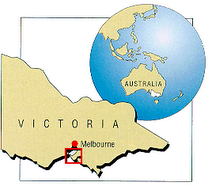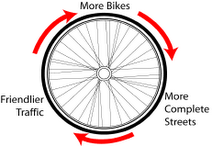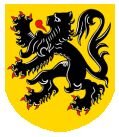
from the
Adelaide Advetiser/Sunday Mail ( this is touching story & a plea to help find the lost diary of Leszeka Wereszka, lost near Nimmitabel in NSW... Leszeka was killed in South Australia when hit by a truck 70klm from his final destination on his journey around Australia)
(The final photo of Leszeka Wereska taken two hours befor he was killed by a truck whilst riding his bike on an epic journey around Australia)
by: KATE KYRIACOU
August 19, 2007 12:15am
THIS is the final photo of a triumphant Leszek Wereszka - two hours before his death on the final leg of a dream ride around Australia.
The Polish-born German tourist had just 70km left of a six-month, 20,000km ride around Australia when he was hit and killed by a passing truck on Port Wakefield Rd on Monday.
His Adelaide relatives said they want to share his inspirational journey with others and hoped his death would prompt motorists to take more care around cyclists.
"We are just hoping one thing – we want to make drivers aware of cyclists on the road," his Adelaide cousin Janusz Wereszka said.
"If this can save even one life, then it is worth it. Maybe one day someone can finish his journey – he only had 70km left.
"Maybe something will be done now to make it safer for cyclists on our roads because right now his death is just so senseless."
Mr Wereszka, 49, studied English for a year before travelling to Adelaide, where he lived for three months while readying for his trip.
He set off on February 3, leaving Adelaide and touring the Great Ocean Rd before cycling on to Melbourne, through the Blue Mountains, Canberra, Sydney, Brisbane, Cairns, Cape Tribulation, Katherine, Darwin and along the West Australian coastline.
He had cycled across the Nullarbor and through SA's west when he was killed on his final leg to Adelaide.
But family friend George Gorski said Mr Wereszka left behind a precious gift – diaries of his trip and hundreds of photographs.
"It is not important that he died," he said. "What is important is how he died – he died doing what he loved. He found his way on this journey. He reconciled himself with his life and he left these wonderful diaries behind."
His journal entries – written in Polish – refer frequently to his beloved daughter Ania, 27, and talk of his safety concerns while cycling on the open roads.
"We strongly believe his achievements and his amazing endurance deserve to be recognised and remembered," Mr Gorski said.
"He made hundreds of friends around Australia on his travels. He was quite an adventurous man with a very cheeky sense of humour.
"We were all waiting for him to come back so we could hear all his stories from the road – but obviously that never happened.
"We know he fell in love with the Australian countryside and he spoke often of camping on the side of the road and watching the shooting stars. He would wake up with the lizards and the snakes, and the dingoes."
Mr Gorski said Mr Wereszka separated from his wife 10 years ago and had spent the past few years getting to know Ania again.
"I know his greatest regret would be that he never had a chance to tell his daughter how much he loved her," he said.
"He had so much time to think on the road and he really learnt the importance of family.
"He missed her so much and always worried about her. He was so very proud of Ania."
Cousin-in-law Barbara Wereszka said she cherished the three months he lived in their Onkaparinga Hills home.
"He was such a beautiful man, always smiling, always happy," she said. "He loved all the animals here and gave them new names – even my chickens."
In his diary entries, Mr Wereszka often questioned the trip that had brought him so far from his family.
"What is this all about? Where will this road lead me at the end?" he wrote while touring the Wombeyan Caves in early March.
"It seems like I am always choosing the wrong direction.
"I realised today how much I am missing all of you – but enough of that. I had death in my eyes today as I rode downhill wondering if my brakes would hold out a bit longer, but in the end they still managed to work."
Other entries showed his cheeky personality:
March 9, 2007, Black Springs:
I am in a place with many caves and holes in the ground. Today a driver purposely splashed me with water from the side of the road as he went past.
March 19, 2007, Booti Booti National Park:
I'm worried that I am not eating enough. I am losing too much weight. In truth, I am only managing one meal a day. As soon as I can I will stop at a fish and chips shop.
March 31, 2007, Noosa Heads:In Port Pirie, Mr Wereszka reflected on whether the momentous journey had changed him as a person.
By the end of each day I am trying to find a place to stay for the night. The first caravan park I went to was $22.50 per night. It's not cheap. I still have a bit of daylight left so maybe the next caravan park will be cheaper. At the next place a horrible looking woman told me the price was $25. I knew there was one more caravan park I could get to but when I got there the price was $26!
"All that thinking but I am almost 50 years old and my life is just beginning!" he wrote.
"Could you wish for anything more than 50 years of childhood? Ha ha, I don't think so.
"But at least I have grown up and gotten to the point where I know who I want to be.
"I want to be a good man – there aren't many of them around."
In his final entry, Mr Wereszka wrote of his exhaustion after so many days on the road.
"I arrived at the camping place," he wrote the day before his death.
"I arrive at 6.30pm just as it becomes dark.
"I was so tired and cold and I look horrible. You can barely move your hands by the end of the day and it is hard to even get off the bike.
"But I survived again. Tomorrow is Adelaide.
"I promised my beloved bike that if we finish this trip we are great. Ha ha ha."
Mr Wereszka lost one of his diaries at a visitor information booth in Nimmitabel, NSW. If anyone finds the journal, written in Polish, please contact the Sunday Mail on (08) 8206 2720.


















